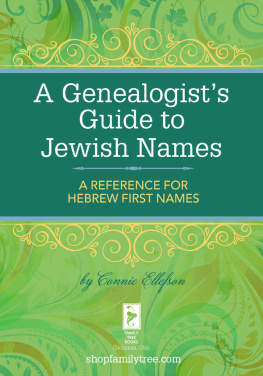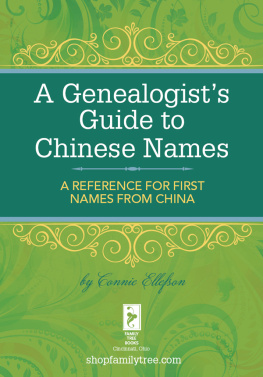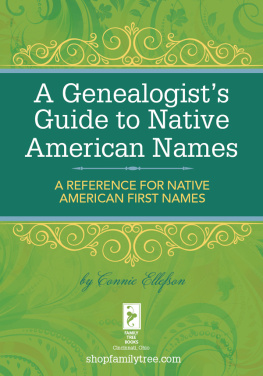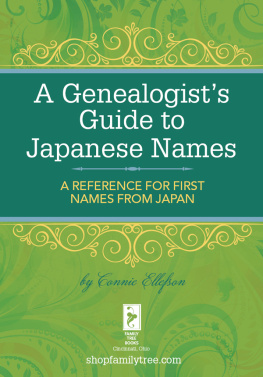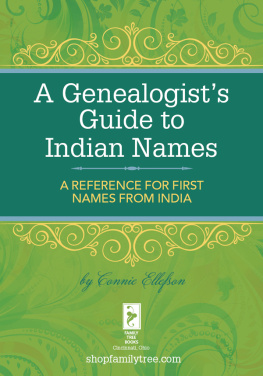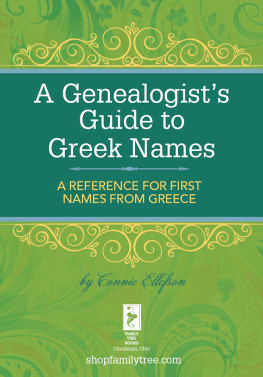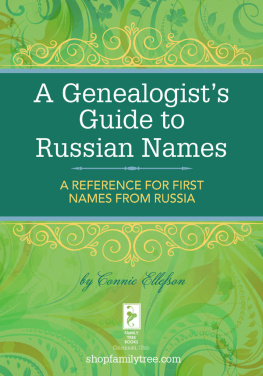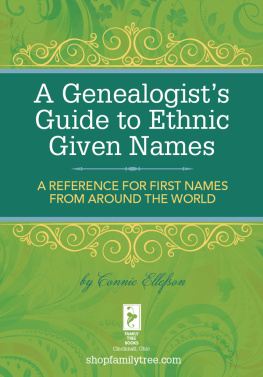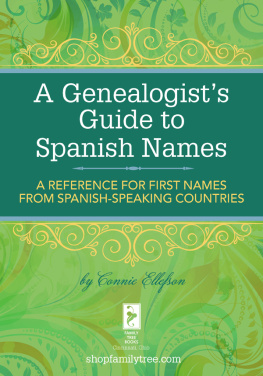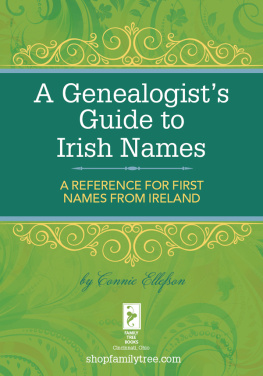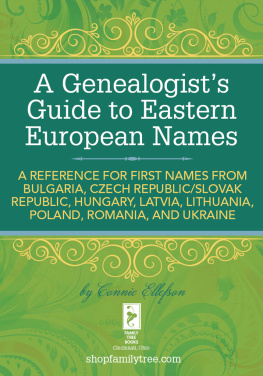A Genealogists Guide to Jewish NamesA REFERENCE FOR HEBREW FIRST NAMESby Connie Ellefson Cincinnati, Ohio shopfamilytree.com
Israel
History
The first Jewish immigrants were Portuguese Jews who came from Brazil to New Amsterdam (New York) in 1654 to escape religious persecution. Since then, Jewish immigration has been almost continuous, although it was low during colonial times and in the early eighteenth century. Between 1830 and 1860, the U.S. Jewish population rose from 6,000 to 150,000 and then to 250,000 by 1880. Between 1882 and 1924, an estimated 2.3 million Jews immigrated to the U.S. The restrictive 1924 immigration law and the Depression lowered the immigration considerably; however, between 1925 and 1975, another 576,000 Jews immigrated.
Before the Civil War, German Jews were the largest group. They moved west as merchants and assimilated easily into an expanding economy. Between 1881 and 1924, one-third of the Jews in Eastern Europe left their homes, and over 90 percent of those came to the U.S. A declining death rate and rising birth rate had caused overcrowding in the restricted areas (Pales) in Russia and Poland, outside of which Jews were rarely allowed to live. Restrictive laws increasingly made it difficult for them to make a living, and later, outright violence caused Jews to begin immigrating in numbers that swelled to a peak of 152,000 in 1906. Most of them were young skilled workers, often in the garment trades.
Seventy percent of the 1.5 million Jews who immigrated between 1899 and 1914 stayed on in New York City. Other destinations included large cities along the Eastern seaboard, as well as Chicago, Philadelphia and San Francisco. Since the founding of the Israeli state in 1947, more than 300,000 Jews have emigrated from Israel. Some left to search for wider opportunity or remove themselves from the frequent threat of wars. Among those numbers may be American Jews who went to live for a while in their symbolic homeland and then returned to the U.S.
Naming Traditions
A Jewish child may be named after any person, friend or relative.
Naming a child after a family member is intended to preserve family memories and maintain a living memorial to that person. Among the Jews from central and eastern Europe (the Ashkenazim), a child is customarily named after a deceased loved one. However, among Sephardim (from Middle Eastern countries), a child is usually named after a living grandparent. Both customs reflect the hope that the good qualities of the namesake will be reborn in the child. Thus, similar given names remain in the family for generations. Because of the dispersion of Jews, the name of the deceased may be translated into the adopted lands language from Hebrew.
In America and many European countries, a child is often given both a Hebrew name after a relative and one common to the land of the childs birth. The naming trends in Israel have closely followed the recent history of the Jewish people. Throughout the 1920s, 1930s, and 1940s, as the idea of a Hebrew state gathered momentum, it was very important to name children with purely Hebrew names. After the Holocaust of World War II, a wave of Yiddish names occurred, following the Jewish custom of naming a child after a recently deceased relative. Many of the European Jews who were murdered spoke Yiddish, a Middle High German language mixed with Hebrew, Aramaic and several other Romance and Slavic languages. After the 1940s, Hebrew names became popular in the newly formed state of Israel as Jews attempted to put the past behind them and look to the future.
Now Israelis choose names from a variety of sources, including Hebrew names, nature names, place names in Israel and American-influenced names. Israeli parents are likely to pick a very trendy name (that is, trendy in Israel) or else search diligently for a very unusual Hebrew name. Although Yiddish names are rarely chosen in Israel today, several have been included in the name list for interest.
Pronunciation
a = ah as in ball e = eh as in late i = ee as in keep o = o as in go, an abbreviated sound which eliminates the near diphthong sound used in American pronunciation (oh) u = oo as in moon c before e = k g = g as in go j = y as in yes ch = a guttural sound pronounced at the back of the throat, roughly estimated with khh ie = ee-eh th, b, z as in English
Israeli Female Names
Adah (ah-DAH) (H) ornament; Ada
Adena (ah-deh-NAH) (H) adornment; Adene, Adina, Dena, Dina
Adina (ah-dee-NAH) (H) slender, pliant
Afra (H) female deer
Ahuva (ah-hah-VAH) (H) love, beloved; Ahava, Ahuda
Ailat (eh-LAHT) (H) hind, roe
Akiva (H) protect; Kiva, Kivi, Kiba, Akiba
Aleeza (H) joy; Aliza, Alizah, Alitza, Aleezah
Alona (H) oak tree; Allona, Allonia, Alonia
Alumit (ah-LOO-meet) (H) girl; Aluma
Amira (Y) ear of grain Ana grace
Anat (H) sing
Arielle (H) lion of God; Ariela, Ariellil, Ariel
Ashira (H) wealthy (old-fashioned)
Atalia (H) the Lord is mighty
Ateret (ah-tah-REH) (H) crown; Atarah, Atara
Atira (H) prayer
Avichayil (ah-vee-KHAH-eel) (H) strong father;
Abichail (old-fashioned)
Avigail (ah-vee-GAH-eel) (H) fathers joy; Abichail
Avivit (H) feminine for Aviv; ear of corn, spring, freshness; Avivi, Aviva
Aya (ah-YAH) (H) bird
Ayalah (ah-YAH-lah) (H) hind, roe
Aziza (H) feminine for Aziz
Bat-
tseeyon (baht-tsee-ON) (H) daughter of Zion; Bath-Zion
Bathsheba (H) daughter of Sheba; Bathseva, Bathshua, Batshua, Batsheba
Batya (H) daughter of God; Bitya
Beruriah (beh-ROO-ree-ah) (H) chosen by God
Blima (BLEE-mah) (Y) flower; Blime
Brachah (BRAH-khah) (H) blessing
Carmela (cahr-MEH-lah) (H) garden
Chanah (KHAH-nah) (H) grace; Hannah
Chasidah (khah-SEE-dah) (H) pious woman (old-fashioned)
Chasya (KHAHS-yah) (Y) to find shelter; Chasye (old-fashioned)
Chava (H) life; Chaya, Haya, Chabah, Eva, Chayka
Chaviva (khah-VEE-vah) (H) beloved; Eva
Chedva (KHEHD-vah) (H) joy
Chephzibah (KHEFH-see-vah) (H) my delight is in her; Hepzibah
Clara (Y) clean
Cochava (ko-khah-VAH) (H) star
Daganyah (H) ceremonial grain; Daganya
Dalit (DAH-leet) (H) draw water; Dalis
Daliyah (DAH-lee-yah) (H) a branch; Daliah
Daniela (H) God is my judge; Danya
Danit (DAH-neet) (H) to judge
Daphnah (DAHF-nah) (H) laurel
Davida (dah-VEE-dah) (H) beloved; Davi, Davita, Davina
Derora (H) freedom; Derorit, Derorice
Devora (H) bee; Deborah, Debora
Diklit palm tree, date tree; Dickla, Diklice, Dikla
Dinah (DEE-nah) (H) adjudged, vindicated; Dina
Divsha (DEEV-shah) (H) honey (old-fashioned)
Dobeh (Y) bee; Dobra
Dorit (do-REET) (H) of this generation
Edna 
